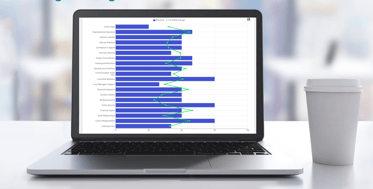
It was over 100 years ago that Theodore Roosevelt coined the phrase “I believe that the more you know about the past, the better you are prepared for the future.” And in project and change terms, that is advice that is as valuable today as it was way back then.
At Changefirst we are committed to data driven change management - using data from the past to shape and guide future change planning and our most recent change management research with almost 10,000 respondents clearly telling us - that while people commitment and user adoption are central to creating value from business changes - there is still a tendency, from early project scoping and planning, to under-estimate or even overlook known people issues.
So let’s look at the “back” data from our Initiative Legacy Assessment – for context first. Back in March 2016, data from 5,867 people around the world told us that new changes are being initiated in a corporate environment where:
- 21% of people are expected to remain resistant to change,
- 54% of people may accept that change is inevitable, but are not personally committed to its success,
- 25% of people are expected to personally commit to change and its sustainability
Fast forward two years, and rather disappointingly data from almost 50% more people tells a very similar story as shown in our table below.

Source:Changefirst’s Initiative Legacy Assessment 2016 – 2018
Not only is this story relatively unchanged over the last 3 years, the message is consistent across multiple industries and different project types (see the diagram below).

And this goes some way to explaining the significant dilution in the value of major programmes implemented by 88% of organisations – according to Bain in 2016.
So what can organizations do to overcome the issue?
Some practical recommendations for you to consider and adopt are:
- Carry out some form of an Initiative Legacy Assessment
At the most fundamental level, organizations should always carry out an Initiative Legacy Assessment or similar. If it’s not part of your current change management process, then you need to introduce it as part of the early planning of projects, preferably in the project design phase so that adjustments can be made prior to project commencement. Make it part of your data driven change management strategy.
- Consider initiating fewer change projects. And doing it successfully.
If you do use Initiative Legacy Assessment data as a crucial part of early scoping on projects, baseline risk profiling, and even project ‘Go-No’ decisions then take time to assess what the data is elling you – and, if need be, consider initiating fewer change projects with a load that more closely matches internal capacity for change.
And that provides an increased chance of project success across your organization.
- Identify risks early and mitigate them
Finally, if you do adopt this type of approach, then make sure that an early identification of risks leads to a higher probability of success by creating an effective risk mitigation plan very early in the process.
To learn more – download our research summary on the 2018 Power of Data ebook which is available here.
__________________________________________________________________
About the Initiative Legacy Assessment (ILA)
 The data sourced in this blog post was provided by the Initiative Legacy Assessment which is just one of 9 proven change assessment tools available via our Roadmap Pro platform.
The data sourced in this blog post was provided by the Initiative Legacy Assessment which is just one of 9 proven change assessment tools available via our Roadmap Pro platform.
The ILA is a diagnostic survey tool modelled on the 6 Critical Success Factors (CSFs) for single initiatives. It takes a historical performance check against the 6 CSFs using a total of 20 questions, which relate to 20 specific risk dimensions.
Respondents are asked to consider a “typical” change from past 24 months which impacted their work group directly.
The purpose of the ILA is to collect historical data, from those involved in the change initiative, to:
- help predict likely levels of commitment/resistance for initiatives
- measure the effectiveness of previous implementations with respect to the CSFs
- predict likely barriers to successful implementation of any initiative
- help facilitate corrective and enhancing action planning for a specific initiative
To book a personalised demonstration of Roadmap Pro visit our website – and click on schedule demo.


Leave a comment